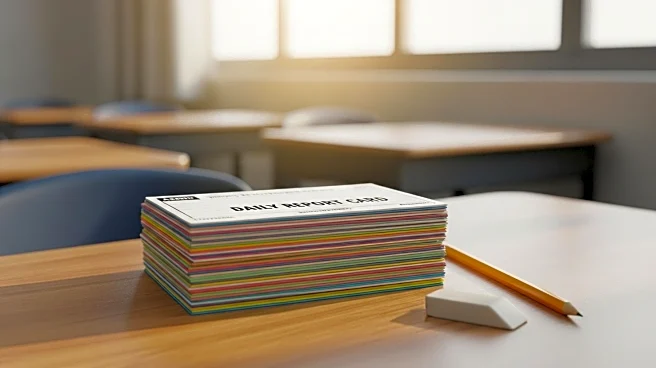What's Happening?
Students with ADHD often face punitive measures in schools due to behaviors such as inattention and impulsivity, which are not typically welcomed in classroom settings. This has led to higher rates of suspension and expulsion among these students compared to their peers. A lack of training for teachers on managing ADHD behaviors contributes to this issue. Gregory Fabiano, a psychology professor at Florida International University, advocates for the use of daily report cards as a positive reinforcement tool. These report cards set specific, daily goals agreed upon by teachers, students, and parents, with rewards for meeting these goals. This approach aims to provide immediate feedback and a fresh start each day, which can be more effective than traditional report cards for students with ADHD.
Why It's Important?
The implementation of daily report cards for students with ADHD is significant as it addresses the disproportionate disciplinary actions these students face. By focusing on positive reinforcement rather than punishment, this method can improve classroom behavior and reduce incidents of disruptive behavior. This approach not only benefits students by providing a more supportive learning environment but also aids teachers by reducing classroom disruptions. The broader impact includes potentially lowering dropout rates among students with ADHD, as they often disengage from school due to negative experiences. This strategy highlights the importance of tailored educational interventions in promoting inclusivity and success for all students.
What's Next?
Schools may consider adopting similar strategies to support students with ADHD, potentially leading to policy changes in how behavioral issues are managed. Educators and administrators might seek additional training to effectively implement these interventions. The success of such programs could encourage further research into personalized educational tools and their impact on student outcomes. Stakeholders, including parents and educational policymakers, may advocate for broader adoption of these practices to ensure equitable educational opportunities for students with ADHD.
Beyond the Headlines
The shift towards positive reinforcement for students with ADHD could influence broader educational practices, emphasizing the need for individualized support systems. This approach may also prompt discussions on the ethical implications of current disciplinary practices and the importance of mental health awareness in education. Long-term, this could lead to cultural shifts in how behavioral challenges are perceived and addressed in schools, promoting a more inclusive and understanding educational environment.









